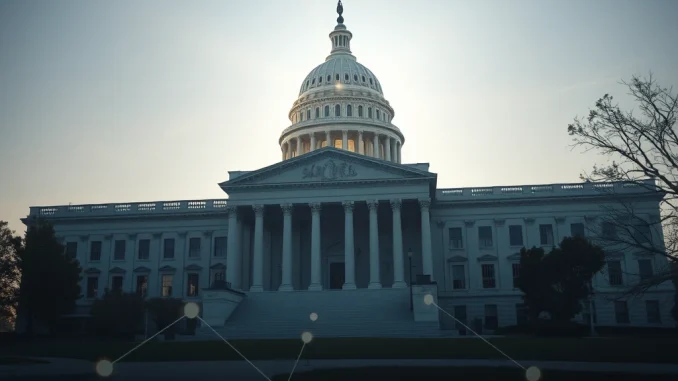
Hold onto your hats, crypto enthusiasts! In a stunning turn of events, the U.S. Senate has delivered a major win for the digital asset industry. By a resounding 70-28 vote, they’ve decided to repeal the controversial IRS DeFi broker rule. This move, celebrated across the crypto space, signals a potential shift in how digital assets are regulated and taxed in the United States. What does this mean for you, and what happens next? Let’s dive into the details of this monumental decision.
What is the IRS DeFi Broker Rule and Why Was it Controversial?
Before we celebrate, let’s understand what exactly the IRS crypto rule was and why it sparked so much debate. Finalized in the waning days of the previous administration, this rule aimed to classify DeFi (Decentralized Finance) brokers under traditional brokerage regulations. In essence, it mandated that these brokers report the total proceeds from digital asset sales to the IRS. Sounds simple enough, right? Not quite. Here’s why the crypto community raised a collective eyebrow:
- Broad Definition of ‘Broker’: The rule’s definition of a ‘broker’ was incredibly broad and ambiguous. It potentially encompassed not just centralized exchanges, but also decentralized exchanges (DEXs), DeFi protocols, and even individual users involved in certain DeFi activities. This vagueness created massive uncertainty and compliance nightmares.
- Technical Impossibility: DeFi, by its very nature, is decentralized and often anonymous. Forcing DeFi protocols to comply with traditional broker reporting requirements is technically challenging, if not impossible. Imagine trying to get a decentralized, automated smart contract to file tax forms!
- Innovation Chill: The crypto industry argued that this rule would stifle innovation in the rapidly growing DeFi sector. The burdensome reporting requirements could drive DeFi activity offshore and hinder the U.S.’s competitiveness in the global digital economy.
- Privacy Concerns: The rule raised serious privacy concerns for crypto users. Forcing DeFi platforms to collect and report detailed user data could undermine the principles of decentralization and pseudonymity that are core to many crypto enthusiasts.
In short, the IRS crypto rule was seen as a square peg trying to fit into a round hole – a traditional regulatory framework being awkwardly imposed on a fundamentally different, decentralized technology. The crypto industry feared it would be overly burdensome, technically unworkable, and ultimately detrimental to the growth of DeFi in the U.S.
The Senate Steps In: A Bipartisan Pushback Against Crypto Tax Overreach
Enter the U.S. Senate, where a surprising level of bipartisan agreement emerged to challenge this DeFi broker rule. In a vote that transcended party lines, 70 senators voted in favor of a resolution to repeal the rule. This strong bipartisan support highlights a growing understanding among lawmakers of the complexities of cryptocurrency and the potential pitfalls of overly broad regulations.
According to reports from Eleanor Terrett, a former Fox Business reporter, and The Block, key figures within the White House also signaled support for the repeal. David Sacks, a White House advisor on crypto and AI, reportedly indicated that senior officials plan to recommend President Trump approve the repeal. This suggests a coordinated effort across different branches of government to reconsider the regulatory approach to DeFi.
Why is this bipartisan support significant?
- Broader Acceptance of Crypto: Bipartisan agreement on crypto issues, especially in a politically polarized environment, indicates a growing mainstream acceptance of digital assets and their importance.
- Nuanced Regulatory Approach: It suggests a shift towards a more nuanced and informed approach to crypto regulation, moving away from one-size-fits-all solutions and towards frameworks that consider the unique characteristics of blockchain technology.
- Industry Advocacy Matters: The strong industry opposition to the IRS DeFi broker rule and the advocacy efforts of crypto organizations clearly played a role in swaying lawmakers and influencing this bipartisan outcome.
This US Senate vote is not just a procedural step; it’s a powerful message that lawmakers are listening to the concerns of the crypto industry and are willing to re-evaluate regulations that could stifle innovation.
What Happens Next? Awaiting Presidential Approval and the Future of Crypto Tax
The resolution to repeal the IRS DeFi broker rule now moves to the final stage: President Donald Trump’s desk. If he signs the resolution, the rule will be officially overturned, marking a significant victory for the crypto industry. While presidential approval is widely anticipated given the reported White House support, it’s crucial to remember that nothing is final until it’s signed into law.
What are the potential implications if the repeal is approved?
- Relief for DeFi Platforms: DeFi protocols and decentralized exchanges would breathe a sigh of relief, no longer facing the immediate threat of burdensome and technically challenging reporting requirements.
- Boost for DeFi Innovation: The repeal could unleash a new wave of innovation in the DeFi space within the U.S., as companies and developers feel more confident in building and operating without the shadow of overly strict regulations.
- Rethinking Crypto Tax Policy: This event could prompt a broader re-evaluation of how digital assets are taxed in the U.S. It might open the door for more tailored and crypto-native tax policies that are better suited to the decentralized nature of blockchain technology.
- Increased Investor Confidence: The positive regulatory signal could boost investor confidence in the crypto market, potentially attracting more capital and driving further growth.
However, it’s important to temper expectations. Repealing this specific rule doesn’t mean that crypto regulation is going away. Governments worldwide are still grappling with how to regulate this nascent industry, and further regulations are inevitable. The key is to ensure that future regulations are well-informed, balanced, and designed to foster innovation rather than stifle it.
The Path Forward: Towards Sensible Crypto Regulation and Digital Asset Growth
The US Senate vote to repeal the IRS DeFi broker rule is a crucial step in the right direction. It demonstrates that policymakers are beginning to understand the nuances of the crypto space and are willing to listen to industry concerns. This victory should be seen as an opportunity to engage in constructive dialogue with regulators and lawmakers to shape future crypto policy.
What can the crypto community do now?
- Continued Education: Keep educating policymakers and the public about the benefits and complexities of cryptocurrencies and blockchain technology.
- Proactive Engagement: Actively participate in regulatory discussions and consultations, providing valuable insights and expertise.
- Responsible Innovation: Continue to build innovative and responsible crypto solutions that address real-world problems and demonstrate the positive potential of digital assets.
- Industry Collaboration: Strengthen industry collaborations and advocacy efforts to ensure a unified voice in shaping crypto policy.
The journey towards sensible crypto regulation is a marathon, not a sprint. But moments like this – where the U.S. Senate takes a stand for innovation and against overly burdensome rules – provide hope and momentum. By working together, the crypto industry and policymakers can forge a path towards a future where digital assets thrive within a clear, balanced, and innovation-friendly regulatory framework. Keep watching this space – the future of crypto in the U.S. is being written right now!



